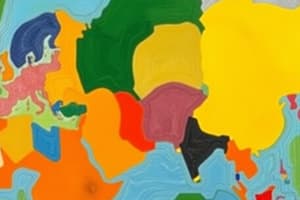Podcast
Questions and Answers
What distinguishes human cultural adaptation from that of chimpanzees?
What distinguishes human cultural adaptation from that of chimpanzees?
- Humans do not use tools.
- Humans experience cumulative cultural adaptation, while chimpanzees do not. (correct)
- Chimpanzees communicate through advanced languages.
- Chimpanzees can build complex tools.
What capability allowed modern humans to inhabit diverse environments around the world?
What capability allowed modern humans to inhabit diverse environments around the world?
- Ability to create languages.
- Genetic mutations suited to the environment.
- Seasonal migration patterns.
- Cumulative cultural adaptation. (correct)
Which psychological dispositions have evolved in humans to enhance their cultural cooperation?
Which psychological dispositions have evolved in humans to enhance their cultural cooperation?
- Antagonism towards outsiders.
- Solo survival tactics.
- Emphasis on individual achievements.
- Tendencies to trade and form alliances. (correct)
What is an example of cultural nepotism as mentioned in the content?
What is an example of cultural nepotism as mentioned in the content?
What role did tribes play in the evolutionary history of humans?
What role did tribes play in the evolutionary history of humans?
What is one potential consequence of globalization on cultural diversity?
What is one potential consequence of globalization on cultural diversity?
What does the term 'cumulative cultural adaptation' refer to?
What does the term 'cumulative cultural adaptation' refer to?
Which of the following best illustrates the significance of the 'capacity for culture' in humans?
Which of the following best illustrates the significance of the 'capacity for culture' in humans?
How has the rise of archiving technology impacted cultural evolution?
How has the rise of archiving technology impacted cultural evolution?
What aspect distinguishes humans from other animals regarding culture?
What aspect distinguishes humans from other animals regarding culture?
Flashcards are hidden until you start studying
Study Notes
Globalization & Cultural Homogenization
- Starbucks is an example of cultural homogenization, having nearly 20,000 stores in 60 countries, serving a standardized product to a vast audience.
- This trend raises concerns about the loss of cultural diversity and the potential Westernization of society.
Capacity for Culture
- Humans possess a unique "capacity for culture," enabling them to build upon existing knowledge and innovations, unlike other animals.
- This "cumulative cultural adaptation" allows for the accumulation and transmission of cultural knowledge across generations, accelerating progress.
- Examples include the evolution of the axe and bow, showcasing how successive generations refine tools through incremental improvements.
Cumulative Cultural Adaptation and Technology
- Archiving technology, from papyrus scrolls to the internet, further enhances our ability to share knowledge, widening the gap between human and animal cultural evolution.
- Chimpanzees, despite their tool use, lack cumulative cultural adaptation, repeating the same behaviors generation after generation.
Humans' Evolutionary History and Cultural Diversity
- 60,000 years ago, cumulative cultural adaptation enabled early humans to expand beyond Africa, adapting to diverse environments and developing distinct cultures.
- These cultures reflect unique beliefs, customs, languages, and religions, shaped by environmental pressures and historical experiences.
Cultural Nepotism and Psychological Dispositions
- Humans have evolved psychological dispositions for cooperation, affiliation, coordination, and exchange, facilitating group cohesion and societal functioning.
- Cultural nepotism, a strong attachment to one's own culture and its members, manifests in emotional responses to events affecting "in-group" members.
- This emotional bias is evident in how we react to the loss of a soldier from our own nation compared to a soldier from another nation.
- Cultural nepotism is further demonstrated by everyday behaviors like holding doors for people or giving up seats on trains primarily for members of our own cultural group.
Studying That Suits You
Use AI to generate personalized quizzes and flashcards to suit your learning preferences.




